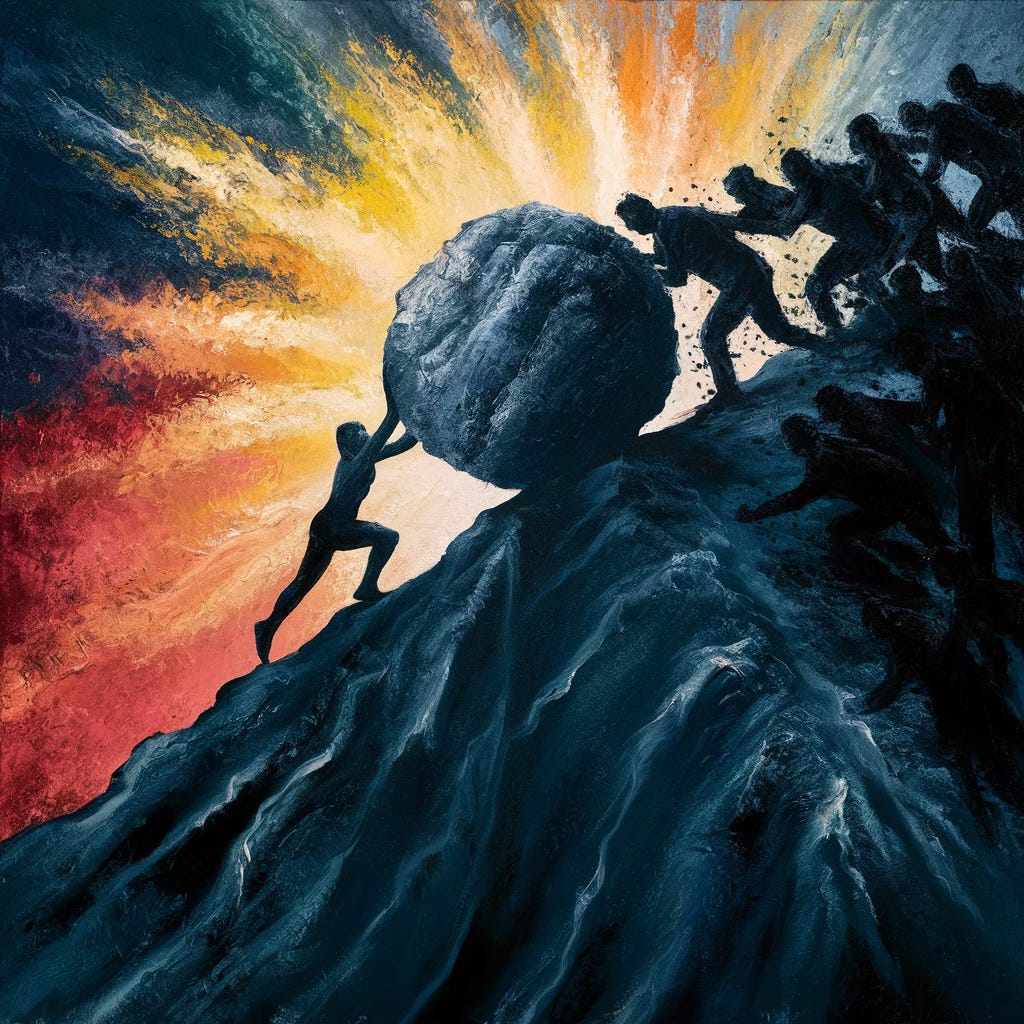We Say We Need Wisdom, so Where Are All the Wise Leaders?
Why do so many selfish, impulsive, immature, ego-driven people ascend to the highest echelons of organisations and governments? Is the dearth of wise leaders an accident or outcome of flawed design?
Some time ago, a senior leader pointed out to me that the traditional corporation seems eerily similar to traditional schooling. “We’ve never actually finished high school!” she said.
Hierarchical structures place more senior staff in charge of more junior staff and there is always someone in authority telling people what to do. People ‘graduate’ (aka ‘get promoted’) into ever ‘higher’ positions pending ‘grades’ for ‘good performance’. They are rewarded for their efforts with more formal power, salary increases and bonuses - ‘prizes’ for doing ‘the right thing’ by standards usually set by someone else. Performance matrixes squeeze the measurement of people’s output into pre-defined categories, leaving little room for out-of-the-box contributions. Bell curves breed competitiveness, as there can only be so many ‘top performers’ and not being deemed one has real consequences for people’s income and career prospects. The individual quirks, preferences, maturity and leadership styles of ‘great’ or ‘not-so-good’ ‘teachers’ (aka. ‘bosses’) have a huge (often unrecognised) impact on employees’ learning, performance and well-being. Success in the corporate world is most often measured in (mostly financial) KPIs, just like school success in (too) many countries is often measured in students’ results on standardised tests.
All of this scaffold supports organisations that are increasingly struggling to adapt to a world of mind-boggling change and disruption, a world where, as a species, we’re facing real existential threats and problems we’ve never faced before are staring us in the face.
“We need to accelerate the pace of innovation!”
“We need ethical leaders!”
“Address burnout! Lead with compassion! An organisation is nothing without its people!”
“We need complex thinkers!”
Cry experts on panels and speakers at conferences.
Those of us in the adult development field are hearing our clients talk about “needing future-fit leadership”, “fostering divergent thinking”, “creating environments where people can thrive” and “supporting leaders to deal with complexity”. Whether they use the word or not, our clients are seeking wiser leaders, who can balance the delicate (and often seemingly competing priorities) of performance and wellbeing, profit and purpose, speedy action and purposeful reflection, decisiveness and participation, courageous challenge and compassionate support. And yet, the systems these leaders operate in every day are, more often than not, designed to work against all of these aspirations.
Organisations want leaders to step back and delegate more, but they sanction them when their teams make mistakes.
They want leaders to care and spend time developing their people, but they pressure them to deliver quarterly numbers.
They agree that deep transformation takes time, yet they want to see it happen after a one-day workshop.
Teams go on retreats and open their hearts to each other, only to return to the office and jump right back into the cut-throat culture of cost-cutting and delivering results now.
Companies seek to be perceived as socially responsible actors and push for ethical leadership, but only until doing the right thing seems to hurt their bottom line and then opportunistic, ‘corner-cutting’ behaviours start being tolerated if they lead to ‘good numbers’.
A worrying statistic shows that the prevalence of psychopaths in top leadership positions tends to be higher than in the general population. Even more worryingly, it has shown a difference in gender perceptions - where “men with psychopathic tendencies were more likely to become leaders and were rated as more effective leaders. However, women who displayed psychopathic tendencies were less likely to be selected as leaders and were rated as less effective leaders”. I won’t even go into the implications of that finding!
Luckily, most of our leaders are not psychopaths. Many of them have positive intentions and genuinely strive to be and do their best every day. Yet not enough of our leaders show the maturity and wisdom their teams and organisations would need. We seem to be craving the huge benefits of later stages of development, yet we are not willing to face the discomfort late-stage leaders create when they openly question the status quo, push back on authority and start asking “What are we doing this for?”
Instead, corporate cultures moulded after high-school cultures constantly reinforce early-stage patterns - like chasing external accolades, struggling to fit in and be well-perceived, measuring your self-worth through your external success, competing for power and privilege, assuming that ‘more’ is always ‘better’ and, despite talking the talk of wellbeing, company cultures too often regard work-addiction as a badge of honour.
I still remember, almost 20 years ago, one teammate telling me that she felt compelled to come to work an hour early to compensate for leaving at 6 pm the previous day (given that she usually left closer to 8 pm). When I asked her why she felt she had to work like that when our regular hours were 9 to 5, she told me that she simply felt guilty about leaving the office before her team leader did - and her team leader always stayed overtime. Plus, she added: “You can’t ever advance your career if you’re only working the standard hours”. Needless to say that particular belief was shared in the team and nobody in leadership did anything to challenge it, because they too believed the same.
One trend we’ve noticed in the research on vertical development is that leaders who operate from later stages of development often struggle to fit into the earlier-stage cultures of their organisations. Many either go into hiding - behaving in less mature ways simply because it helps them survive their contexts. Others get angry, rebel against the ‘system’ and turn into aggressive advocates for change to the point of the system either rejecting them outright, their efforts being thwarted and them being left out of the decision-making because of their ‘unpopular’ opinions.
Over the past few years, I’ve increasingly seen experienced, mature and wise leaders leave organisations because they could no longer find purpose, meaning or connection, or felt too out of integrity and alignment with their deeper values. Many go on to start their own companies, trying to create their own ‘systems’, or end up joining smaller companies, where the culture is more flexible, more impact-driven and more welcoming to constructive challenge.
Later-stage leaders tend to have a harder time doing things that go against their values - both because they tend to have more awareness over what those values are and also because, as their moral line of development evolves, their orientation towards what is ‘right’ tends to shift from ego-centricity to eco-centricity. Therefore they are less likely to feel at ease in organisations or systems that seem oriented towards short-term, self-serving gains at the expense of longer-term, collectively beneficial impact.
So we seem faced with a paradox. We need the maturity and wisdom enabled by later stages of development to even hope we might find some paths out through the quagmire we have collectively created - a mess that includes, but is not limited to global conflict, climate change and ensuring the emerging power of AI is used for good. Interestingly, late-stage leadership is also good for the bottom line. Yet the institutions we rely on - public and private - are too often steeped in the black-and-white, self-centric, ‘power-over’ outlook of the earlier stages of development.
We crave wisdom and its many gifts but we keep on flushing the wise out of the system.
Stepping back to truly grasp this paradox in all its frightening complexity is no easy task. It might require a personal and collective reckoning with the many ways we keep on sabotaging our best intentions - in our lives, workplaces, communities and societies. At the organisational level, it may ask for an honest look at how well our current approach to promoting and developing leaders is serving us and what we might do differently. It may require some painful conversations and facing some uncomfortable truths about the many ways we are not walking the talk. It may require fewer inspirational speeches and more action.
Action is never glamorous - it’s often messy, flawed and clumsy - but it is in the action where we truly find if we are learning and changing.
For those of us in the adult education field, it may require reflecting deeply about whether what we do as program designers and facilitators truly has an impact and if yes, how do we measure that?
How do we educate for more wisdom - in our families, schools and organisations? How do we build organisational systems that are, in their very structure, wiser?
I’ll leave you with a TED talk that aims to offer one possible answer to this question. Riccardo Semler’s entrepreneurial story and choices go deeply against the grain and have been, for me, an example of how else we might look at aligning our systems with the leadership consciousness we are hoping to see emerge in our organisations. His book - Maverick - now over 30 years old, still seems way ahead of its time.
While I spend most of my time working with individuals and teams, I am painfully aware that you can never disentangle leaders from the systems they are embedded in. For Semler, a leader who had the privilege of shaping his organisation - the distance from talk to action has been a struggle and the journey has not been either smooth or always a resounding success. Yet it has shown that it is possible to reinvent the way we work, to make room for more wisdom.
He understood that individuals cannot be un-moored from the systems they are part of. He dared to experiment, just like another maverick - Buurtzorg CEO Jos de Block - has done decades later. Experiment with building a wiser organisation that fosters, through its very structure, wiser behaviours from all those working for it.
I wonder what this might mean for those of us who design learning within or outside of organisations. What questions might we ask to reveal the many ways the system itself is likely to sabotage our (and its own) efforts? How might we mobilise key leaders to sponsor bolder learning programs, aimed at not just growing individuals, but shaping the system itself? What might be the levers to support transformative learning for both the collective and the individual at the same time?
I’d love to learn what your lived experience is, from the perspectives you inhabit through your own work. What obstacles to embodied wisdom have you seen in the systems you are embedded in? How are you overcoming them?
Dive deeper
I hope you’ve enjoyed this article. If you are curious to dive more deeply into learning about Vertical Development and how it might impact your work and life, check out our online library of webinars and certification programs accredited by the International Coaching Federation.
If you are seeking to train as a developmental coach and get your first ICF credential, admissions are now open for the next group of our ICF Level 1 Foundation Diploma in Developmental Coaching starting in July, with the early bird offer (-500$) ending on the 30th of May. Check out the Program Page for details and reach out for an interview.
Spread the word…
If you want to bring your bit to building a wiser, more conscious world, I hope you share this article with others who could benefit from the learning.
and, if you haven’t done it yet, Subscribe!
Join your nerdy community and let’s keep on staying curious and learning from each other.






Loved this Alis, thank you.